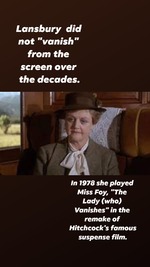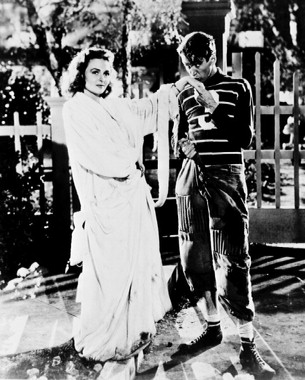 Who is the blogger?
Who is the blogger?
To see a simple English version of reviews about some of the movies, click on the ESL section of Midnight Oil.
Entries by Catherine Savard (118)
Angela Lansbury, More Than "Murder She Wrote"
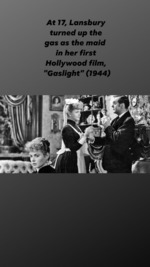 "Murder She Wrote" was not all she did. Angela Lansbury started out in the British Isles as a hardworking actress back in the day. She ended up populating the small screen as a very recognizable face on American TV.
"Murder She Wrote" was not all she did. Angela Lansbury started out in the British Isles as a hardworking actress back in the day. She ended up populating the small screen as a very recognizable face on American TV.
Supposedly, young Angela, her brothers, and her mother came over to America on the last boat organized for refugees from the London Blitz to cross the Atlantic early in World War II. She got her "big break" in restarting in show business in North America by travelling to Montreal, lying about her age (she was only 16 and not 19), and working as a singer in a night club. Later on, when her mother was an out-of-work actress in Hollywood, it was Angela who got the big break by working on a film instead of working at her job at a local department store. Angela played the maid in "Gaslight" in 1944 literally lighting the gas for the big names in Hollywood, Ingrid Bergman and Charles Boyer. This gig resulted in steady work and a multi-year contract with MGM. Angela got the job because she could speak with an authentic cockney accent. She came by it naturally enough because of the time she had spent in poorer sections of East London where her father had been the mayor. Her father died before the war and did not come with the family to the U.S. of A.
Angela married the love of her life, another relatively unknown British actor, when she was 24. Peter Shaw did not work much as an actor throughout their very long 54-year marriage. Peter remained behind the scenes making his wife a great success. Her very brief marriage to another man before this union lasted less than a year. She didn't know that he was gay.
Lansbury worked steadily on both sides of the Atlantic on stage and screen, on radio and television. She played in a range of roles. As she got a bit older, she sometimes played the mother when she was in fact only a few years older than the other actor. This is how she got to be Elvis Presley's mother in "Blue Hawaii" in 1961 when she was 10 years older than him. She also played an elderly 75 year-old main character when she was 44. Her final performance came at 94 on stage in "The Importance of Being Earnest". Lansbury played the plum part of Lady Bracknell, a woman of perhaps half that age in a play written by the witty Wilde one hundred and twenty years before. Lansbury's last professional performance as an actress was in 2019. By the end of her career, she had been nominated for several Oscars, won some 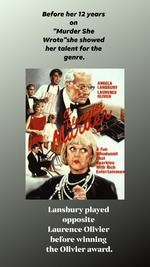 Tonys and collected a host of other nominations, prizes, lifetime achievement and honorary awards. Lansbury even won the Olivier Award for the London Stage theatre sixteen years after playing opposite the legendary actor himself, Laurence Olivier. They were in a made-for-TV movie together. Angela Lansbury was one of a handful of actors who worked consistently at their craft throughout the decades up into their 80s and 90s.
Tonys and collected a host of other nominations, prizes, lifetime achievement and honorary awards. Lansbury even won the Olivier Award for the London Stage theatre sixteen years after playing opposite the legendary actor himself, Laurence Olivier. They were in a made-for-TV movie together. Angela Lansbury was one of a handful of actors who worked consistently at their craft throughout the decades up into their 80s and 90s.
In 1984 when Angela Lansbury played opposite Laurence Olivier in that made for TV movie, "A Talent for Murder", she was essentially auditioning for the role that would make her most famous. In this movie with Laurence Olivier, Lansbury played a mystery writer turned into a daytime real-life sleuth investigating murders in the real world. Lansbury showed that she had the talent to play Jessica Fletcher, the heroine of "Murder She Wrote". The formula worked with the mostly bloodless murder mysteries. A wide-ranging audience from teens to grannies loved the formulaic TV show. It was so popular that it was renewed for12 seasons making it a tie with "Hawaii Five-O" for the longest running TV detective show. With all that blood (NOT) spilled, TV stations have had lots of material with a wide appeal for endless reruns.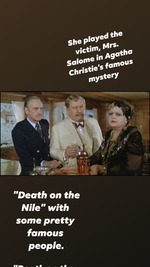
Lansbury has done it all when it comes to the murder mystery. In the 1974 remake of the classic Alfred Hitchcock movie "The Lady Vanishes" she played the lady who vanishes, the mystery woman, Miss Foy. In 1978, Angela progressed on from the nearly invisible Miss Foy to the character of Mrs. Salome, the very visible and overblown character who is one of several victims in "Death on the Nile". The famous plot from master mystery writer Agatha Christie obliged Lansbury to share the silver screen with some famous actors like David Niven and Peter Ustinov. In real life below decks on the real boat where they were filming the movie, Angela was obliged to share her room with bunkmate Bette Davis due to very limited space availability in hot climes. Reportedly, the two actresses became fast friends due to this "tight squeeze" of an experience. In the mid-century, Lansbury managed to play a character who was both the accused and the murderer in a murder trial. It's hard to tell if she is also supposed to be the victim all in one in "Please Muder Me". Apparently, Raymond Burr was doing an inadvertent audition during this film for his future famous role in the long-running legal drama series. Burr 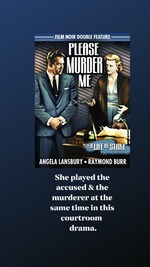
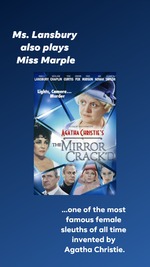 played Perry Mason, a lawyer who ends up finding the real murderer to win his murder cases. Angela Lansbury helped Raymond Burr to become Perry Mason before there was a Perry Mason series. Finally, Lansbury graduated to becoming the great female sleuth of Agatha Christie's creation, Miss Marple. In "The Mirror Crack'd" Miss Marple investigates the attempted murder of a Hollywood film star transported to life in a small English village after she buys a mansion there. Supposedly the Hollywood film star in the movie played by an aging Liz Taylor is loosely based on the tragic events of the real-life Hollywood beauty Gene Tierney. All three of these ladies, Tierney, Taylor, and Lansbury are approximately of the same generation. They were wonderful beauties in their youth and were considered good actresses with very long careers. Each was famous, although not famous during the same era.
played Perry Mason, a lawyer who ends up finding the real murderer to win his murder cases. Angela Lansbury helped Raymond Burr to become Perry Mason before there was a Perry Mason series. Finally, Lansbury graduated to becoming the great female sleuth of Agatha Christie's creation, Miss Marple. In "The Mirror Crack'd" Miss Marple investigates the attempted murder of a Hollywood film star transported to life in a small English village after she buys a mansion there. Supposedly the Hollywood film star in the movie played by an aging Liz Taylor is loosely based on the tragic events of the real-life Hollywood beauty Gene Tierney. All three of these ladies, Tierney, Taylor, and Lansbury are approximately of the same generation. They were wonderful beauties in their youth and were considered good actresses with very long careers. Each was famous, although not famous during the same era.
Before and after her long stint as Jessica Fletcher in "Murder She Wrote" Angela Lansbury had a long and multi-faceted career. In order to retain more control over what happened to the character of Jessica Fletcher, Lansbury became a producer on the show, adding to her credits in the entertainment world and to the show's success. I think that it is fair to say that Angela Lansbury more than met her lifelong goal of being an entertaining entertainer.
See Lansbury's life ambitions upon mature reflection.

Dominick and Eugene (1988)
 “Dominick and Eugene” (1988) has Tom Hulce and Ray Liotta play the parts of twin brothers, one of whom is slightly mentally retarded while the other studies to be a doctor. Hulce plays the slow witted brother. He exchanges comic books with an 11 year old boy on his garbage pick up route, loves pretending he is the Incredible Hulk and has problems remembering his responsibility to walk the dog. The brother played by Ray Liotta is saddled with some of the “adult” concerns of life; trying to plan his medical career, making progress in his love life and keeping his somewhat naïf brother out of trouble with drug dealers, hookers and neighbourhood thugs. Jamie Lee Curtis, the love interest for Gino, finds out that she really doesn’t know what she’s getting into by
“Dominick and Eugene” (1988) has Tom Hulce and Ray Liotta play the parts of twin brothers, one of whom is slightly mentally retarded while the other studies to be a doctor. Hulce plays the slow witted brother. He exchanges comic books with an 11 year old boy on his garbage pick up route, loves pretending he is the Incredible Hulk and has problems remembering his responsibility to walk the dog. The brother played by Ray Liotta is saddled with some of the “adult” concerns of life; trying to plan his medical career, making progress in his love life and keeping his somewhat naïf brother out of trouble with drug dealers, hookers and neighbourhood thugs. Jamie Lee Curtis, the love interest for Gino, finds out that she really doesn’t know what she’s getting into by 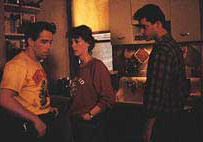 getting involved with her fellow medical student. She’s caught in the middle.
getting involved with her fellow medical student. She’s caught in the middle.
There’s a bit to work out in the space of two hours. Some startling revelations relating to manslaughter, child abuse and kidnapping could be interpreted by the overly cynical film critic to be contrived and overly predictable vehicles for sentimentality. I prefer to see the events and the characters as true to life. It may be hard for some to believe,  but people like this and situations like this really do exist. I for one have met up with some of them. The interpretation of the movie may rest more with the inner state of mind of the reviewer than the actual skill of the actors, directors and writers involved in the movie making. It’s a film that could go either way. I personally put a full three hankie warning on the film (with lots of nose blowing and tear wiping anticipated for anyone who is the least bit emotionally engaged).
but people like this and situations like this really do exist. I for one have met up with some of them. The interpretation of the movie may rest more with the inner state of mind of the reviewer than the actual skill of the actors, directors and writers involved in the movie making. It’s a film that could go either way. I personally put a full three hankie warning on the film (with lots of nose blowing and tear wiping anticipated for anyone who is the least bit emotionally engaged).
>>More to see: Looking for more out of life?
>>Real Life Story: Jimmy’s working class parents weren’t prepared that day when they sent their teenage son to the corner store. What happens in the families of an innocent victim touched by gang violence?
See a video clip from "Dominick and Eugene" (1988)
It's a Wonderful Life (1946)
“It’s a Wonderful Life” is the kind of film everyone loves to see (and see again) no matter what time of year it is. It seems like the more things change, the more a film like this stays the same. It provides a kind of film-watchers’ comfort food as we hurtle at breakneck speed through the ensuing decades of personal, societal, and cinematic evolution. Perhaps some of us are not so sure anymore of why exactly we like this movie, how the tradition of watching it got started or if the film is really all that good in the first place. We know that it’s a 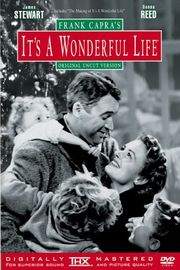 part of a well-worn tradition (like eating fruitcake and turkey giblet gravy at Christmas). For that reason, if for no other, we are bound to see it again some time.
part of a well-worn tradition (like eating fruitcake and turkey giblet gravy at Christmas). For that reason, if for no other, we are bound to see it again some time.
There’s just something terribly likeable about that everyman character, George Bailey (played by Jimmy Stewart). It’s not that he’s all that good looking or extremely clever or exceptionally charming or anything else. He’s just supposed to be an ordinary “nice guy”. In this big old mean old world, even nice guys can have some pretty big problems. At a certain point, George’s charmed life comes crashing in upon him and he finds  himself about to jump off a bridge to put an end to it all. George Bailey wonders out loud if his life has really been worth living. A guardian angel (played by Henry Travers) is immediately dispatched from the heavenly realms in order to put things to rights. With the help of the unearthly messenger, George comes to realize that his life has had a tremendous impact, not only on his immediate family members, but on the whole community.
himself about to jump off a bridge to put an end to it all. George Bailey wonders out loud if his life has really been worth living. A guardian angel (played by Henry Travers) is immediately dispatched from the heavenly realms in order to put things to rights. With the help of the unearthly messenger, George comes to realize that his life has had a tremendous impact, not only on his immediate family members, but on the whole community.
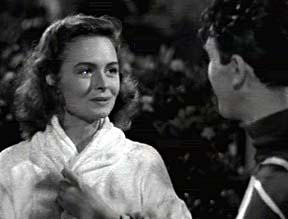 Wholesome is a good word to describe this film. It’s not a type of picture that you would see made today. Maudlin might be another word employed by some detractors of the film who would have little patience for such a cinematic work. But then, such people might not really appreciate how things work and what exactly goes on around the family dinner table each Christmas at our house. There are just certain dishes that Mother makes for every Christmas dinner (like the orange
Wholesome is a good word to describe this film. It’s not a type of picture that you would see made today. Maudlin might be another word employed by some detractors of the film who would have little patience for such a cinematic work. But then, such people might not really appreciate how things work and what exactly goes on around the family dinner table each Christmas at our house. There are just certain dishes that Mother makes for every Christmas dinner (like the orange 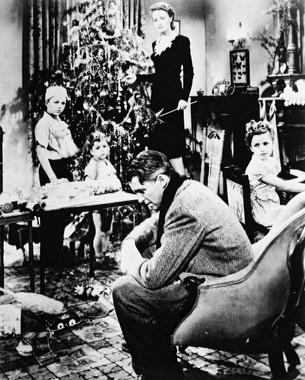 jellied salad or the buttered spicy squash). If you come as a guest for the dinner every year, you know that you are going to have to eat those dishes. It does no good to complain. You might as be reconciled with the traditional menu offering and find the virtues of the said salad. You’ll enjoy things a lot more if you do. And after all, what’s so bad about being good? Milk is wholesome too. It can be quite pleasant if you are used to it. And you would probably miss it if you could
jellied salad or the buttered spicy squash). If you come as a guest for the dinner every year, you know that you are going to have to eat those dishes. It does no good to complain. You might as be reconciled with the traditional menu offering and find the virtues of the said salad. You’ll enjoy things a lot more if you do. And after all, what’s so bad about being good? Milk is wholesome too. It can be quite pleasant if you are used to it. And you would probably miss it if you could 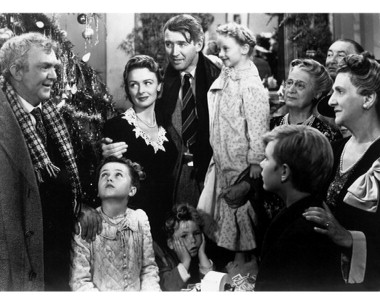 no longer have it. That’s kind of how I feel about “It’s a Wonderful Life”.
no longer have it. That’s kind of how I feel about “It’s a Wonderful Life”.
>>Not so Real Life: Sarah takes a chance on striking out in a new direction. Dealing with disappointments
>>More to see: Looking for more out of life?
See the three minute summary of "It's a Wonderful Life" (1946). Also see the scene where George lassos the moon.
The Shipping News (2001)
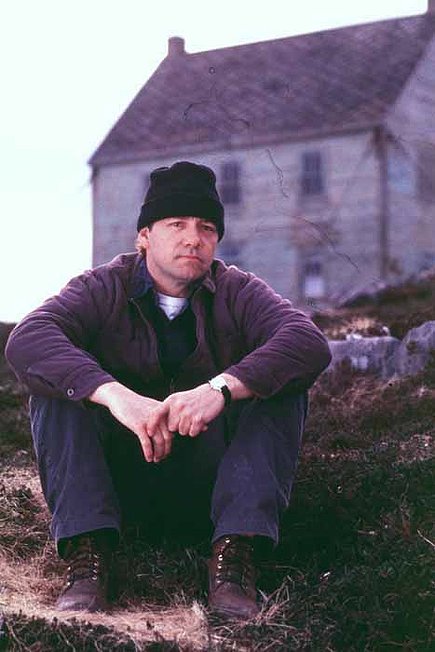 In “The Shipping News” , Kevin Spacey plays Quoyle, a long-time loser with a complicated family history who unexpectedly returns to Newfoundland as a desperate act of self-preservation for himself and his family. The ties that
In “The Shipping News” , Kevin Spacey plays Quoyle, a long-time loser with a complicated family history who unexpectedly returns to Newfoundland as a desperate act of self-preservation for himself and his family. The ties that 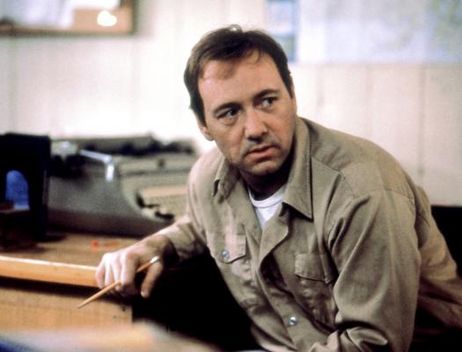 bind are a deep mystery, deeper than the wild blue ocean that itself plays a role in the film.
bind are a deep mystery, deeper than the wild blue ocean that itself plays a role in the film.
Along the way, Quoyle meets a wonderful array of “colourful characters” that includes Judi Dench playing his convoluted Aunt Agnis, Gordon Pinsent as his unanticipated mentor, Scott Glenn as his second-sighted boss, and Cate Blanchett as his  predatory mate. As he sets about making a new life for himself in rural Newfoundland, Quoyle discovers a new set of interests that he never anticipated. He tries his hand at journalism for the local paper. He goes out on the water in his own boat. He catches up with his daughter’s daycare owner, Wavey Prowse (Julianne Moore), and finds out that she’s even more interesting than her name suggests. Quoyle isn’t especially good at any of these things, but he at least gives it a try, and that’s what it’s all about at this stage of his rather stagnated existence.
predatory mate. As he sets about making a new life for himself in rural Newfoundland, Quoyle discovers a new set of interests that he never anticipated. He tries his hand at journalism for the local paper. He goes out on the water in his own boat. He catches up with his daughter’s daycare owner, Wavey Prowse (Julianne Moore), and finds out that she’s even more interesting than her name suggests. Quoyle isn’t especially good at any of these things, but he at least gives it a try, and that’s what it’s all about at this stage of his rather stagnated existence.
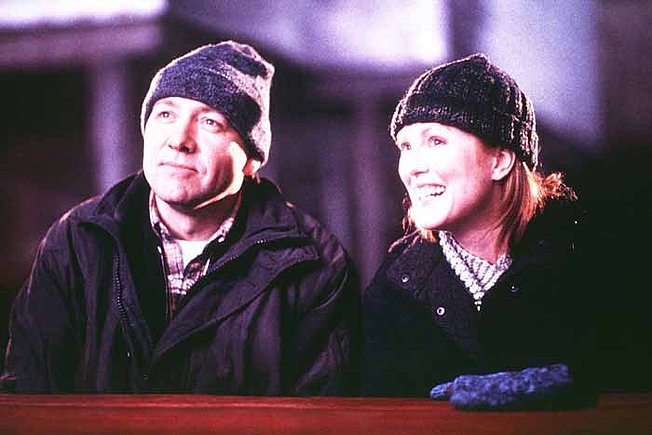 I can’t tell you that the local accents in this film are wonderfully accurate. (They’re not). I can’t say whether very many people still use outhouses in Newfoundland or whether anyone has dragged his house across the ice from the outer islands lately. I can’t really recommend the foul tasting Seal Flipper Pie referred to in the film. (I’ve never had the pleasure.) I don’t know if it’s true that every other inhabitant on the island has run into a moose on the road in winter or had a relative drowned at sea. I don’t know about the second-sight that some claim to have or whether tying mysterious string knots will protect the family or expose them to some terrible other-worldly curse.
I can’t tell you that the local accents in this film are wonderfully accurate. (They’re not). I can’t say whether very many people still use outhouses in Newfoundland or whether anyone has dragged his house across the ice from the outer islands lately. I can’t really recommend the foul tasting Seal Flipper Pie referred to in the film. (I’ve never had the pleasure.) I don’t know if it’s true that every other inhabitant on the island has run into a moose on the road in winter or had a relative drowned at sea. I don’t know about the second-sight that some claim to have or whether tying mysterious string knots will protect the family or expose them to some terrible other-worldly curse. 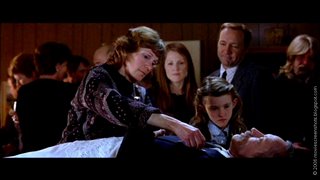 Wake: The Shipping News (credit Moviescreenshots)I’ve never heard of wakes that really wake the dead, but I would not be totally taken aback to see a house chained to the ground for fear of it blowing away in a place like Newfoundland. What I do know is that all the displaced Newfoundlanders I’ve ever met were friendly folk with hearty appetites for this life and the next. I trust that the scenery is every bit as dramatic as shown in this film and that the weather is every bit as bad (when it is bad).
Wake: The Shipping News (credit Moviescreenshots)I’ve never heard of wakes that really wake the dead, but I would not be totally taken aback to see a house chained to the ground for fear of it blowing away in a place like Newfoundland. What I do know is that all the displaced Newfoundlanders I’ve ever met were friendly folk with hearty appetites for this life and the next. I trust that the scenery is every bit as dramatic as shown in this film and that the weather is every bit as bad (when it is bad).
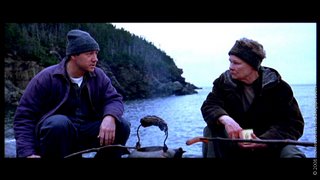 Spacey & Dench (credit Moviescreenshots) It’s enough to make one want to run off to Newfoundland (at least for a visit . . . at least for a visit in the summertime.) So much in this film is only half remembered and half spoken. It makes you long for more. I think that this is perhaps one of the primary virtues of the film. It is as evocative as its hauntingly beautiful musical score. (See the video below.) Maybe the film does not deliver on all levels, but I think it has
Spacey & Dench (credit Moviescreenshots) It’s enough to make one want to run off to Newfoundland (at least for a visit . . . at least for a visit in the summertime.) So much in this film is only half remembered and half spoken. It makes you long for more. I think that this is perhaps one of the primary virtues of the film. It is as evocative as its hauntingly beautiful musical score. (See the video below.) Maybe the film does not deliver on all levels, but I think it has 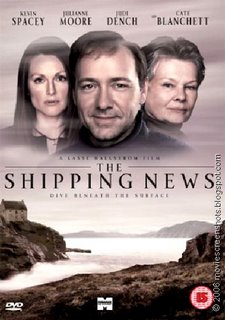 credit: Moviescreenshotsat least this going for it. It opens a window that hints at the “something more” that you can’t quite see from the vantage point of the movie itself. Perhaps the something more is the Pulitzer Prize winning book by Annie Proulx from which the film is derived. Supposedly, the novel is a much better work than the film rendition. Perhaps I should read it some time. Perhaps that would be a more realistic venture than running off to Newfoundland in mid-January on a sight-seeing jaunt.
credit: Moviescreenshotsat least this going for it. It opens a window that hints at the “something more” that you can’t quite see from the vantage point of the movie itself. Perhaps the something more is the Pulitzer Prize winning book by Annie Proulx from which the film is derived. Supposedly, the novel is a much better work than the film rendition. Perhaps I should read it some time. Perhaps that would be a more realistic venture than running off to Newfoundland in mid-January on a sight-seeing jaunt.
See the TVOntario Interviews for The Shipping News(2001): Life Anew. It looks at second chances and issues of renewal through discussions with actors, directors and screenwriters.
>>More to see: Looking for more out of life?
See the trailer for "The Shipping News" (2001)
Hear part of the magical movie score by Christopher Young.
Starting Out in the Evening (2007)
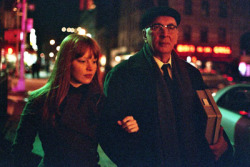 “Starting Out in the Evening” (2007) is actually a film about more than just writers and the craft of writing. It’s about family, career, ambition, following one’s passions, facing death and disappointments . . . and probably a few other things along the way.
“Starting Out in the Evening” (2007) is actually a film about more than just writers and the craft of writing. It’s about family, career, ambition, following one’s passions, facing death and disappointments . . . and probably a few other things along the way.
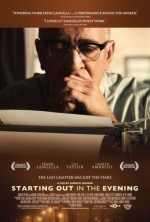 Some may find the film a bit slow and obsessively internally focused. What else can one expect? After all, it’s about the world and the process of being a writer, for goodness sake. (Well, actually, we’re not really too sure for whose sake any of this writing stuff is really for in the end. It seems to me that the film desperately wants to convince us that art for art’s sake is its own reason for being.)
Some may find the film a bit slow and obsessively internally focused. What else can one expect? After all, it’s about the world and the process of being a writer, for goodness sake. (Well, actually, we’re not really too sure for whose sake any of this writing stuff is really for in the end. It seems to me that the film desperately wants to convince us that art for art’s sake is its own reason for being.)
Leonard Schiller has lived the life of a New York intellectual. He now has lots of time to reflect on whether it has all been worth it as he faces the illness and incapacity of old age. He’s been stuck with a bad case of writer’s block for years now. It is high time to face up to the truth: neither he nor the characters of his latest novel are going anywhere. A bright young grad student (Lauren Ambrose) intent on 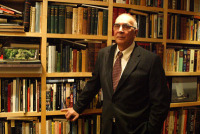 building her own career helps Schiller to realize that he has been following his characters around for years in vain, “waiting for them to do something interesting”. Schiller is faced in the end with a moral dilemma that cuts to the core of his artistic and personal integrity. Does he have the courage to face life the way it really is with its disappointments and limitations and still engage fully in the creative process? Will he do it this time in a wiser, less self-centred way?
building her own career helps Schiller to realize that he has been following his characters around for years in vain, “waiting for them to do something interesting”. Schiller is faced in the end with a moral dilemma that cuts to the core of his artistic and personal integrity. Does he have the courage to face life the way it really is with its disappointments and limitations and still engage fully in the creative process? Will he do it this time in a wiser, less self-centred way?
Schiller’s daughter, Ariel, has a different dilemma. Her life as a former dancer is anchored in a much more physical day-to-day reality, in  contrast to her father’s intellectual pursuits. Ariel has to face her own moral dilemmas and internal wrestlings as she processes what it means to her to be pushing 40 and still be childless. Conflicted desires and yearning for fulfillment bubble up as she faces the mandatory “early retirement” of her dancing career and encounters a former lover who has other priorities in life. (See the video clip.)
contrast to her father’s intellectual pursuits. Ariel has to face her own moral dilemmas and internal wrestlings as she processes what it means to her to be pushing 40 and still be childless. Conflicted desires and yearning for fulfillment bubble up as she faces the mandatory “early retirement” of her dancing career and encounters a former lover who has other priorities in life. (See the video clip.)
Not the film to see if you’re in the mood for an adrenalin rush or up for mindless movie-watching with lots of microwave popcorn on hand . . . It certainly does have its merits though. If you’re not in a rush, why not spend a couple of hours mulling things over with this engaging piece of cinema.
>>More to see: Looking for more out of life?
>>Real Life Story: Successful author, Anne Rice, tells of how the exploration of her personal demons led to writing a series of vampire novels before things take a surprising twist later on in her professional life.
Understand more about "The Written Life" as depicted in SNAM's Interviews about two films which take on the subject of authors and the work of the author. The films described in the Interviews are "Starting Out in the Evening" (2007) and "Infamous" (2006).
See the trailer for "Starting Out in the Evening" (2007)




